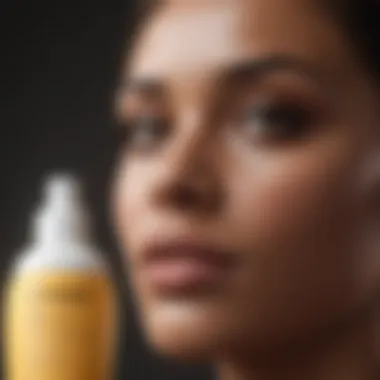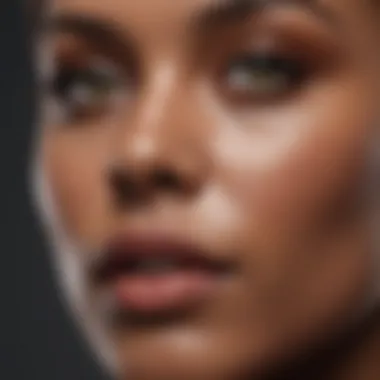Essential Sunscreen Choices for Black Skin


Intro
Understanding the needs of black skin in relation to sun protection is essential. While many people believe that darker skin tones require less sunscreen, this is a misconception. The importance of selecting the right sunscreen cannot be understated, as UV rays can still cause damage regardless of melanin levels.
This article aims to provide in-depth insights into the unique characteristics of black skin, how it interacts with UV radiation, and the specific formulations that best cater to these needs. We will also address common myths surrounding sun safety that often mislead individuals.
Tips and How-Tos
Skincare Routines for Different Skin Types
Establishing a robust skincare routine is pivotal for maintaining healthy skin, especially for black skin. Here are key tips to consider:
- Cleansing: Start with a gentle cleanser to remove impurities without stripping the skin of its natural oils.
- Exfoliation: Regular exfoliation can help to prevent the buildup of dead skin cells. Look for ingredients like glycolic acid or salicylic acid.
- Moisturizing: Use a hydrating moisturizer suited to your skin type. Ingredients like shea butter or jojoba oil are excellent for nourishing black skin.
- Sunscreen: Always apply a broad-spectrum sunscreen with at least SPF 30 every day. This is crucial, even on cloudy days.
Choosing a sunscreen formulated for darker skin tones can help avoid the whitesh cast that some products leave behind. Instead, look for sunscreens that contain tinted moisturizing elements or those specifically designed for melanin-rich skin.
Sustainable Practices
Caring for our skin should align with eco-friendly practices wherever possible. Here’s how:
- Choose Eco-Friendly Brands: Several skincare brands focus on sustainable and ethical practices. Brands like Black Girl Sunscreen offer products that are not only effective but also eco-conscious.
- Minimal Packaging: Look for sunscreens with minimal or recyclable packaging. This reduces waste and is better for the environment.
Celebrating Diversity in Beauty
Understanding the cultural influences on beauty standards is crucial. Black skin has unique attributes that deserve recognition and respect.
Inclusive Beauty Brands
As the beauty industry evolves, more inclusive brands are emerging. They provide a range of products that cater to various skin tones and types. Brands such as Fenty Beauty and NARS have set new standards by ensuring their collections include darker shades.
Additionally, it’s vital for consumers to support brands that prioritize diversity in their marketing and product offerings. This not only promotes inclusivity but also empowers consumers to embrace their unique beauty.
"Understanding your skin’s needs is the first step toward achieving healthier skin."
Understanding Sunscreen
Understanding sunscreen is essential for effective skin protection, particularly for individuals with black skin. This section delves into what sunscreen is, how it works, and the different types available. Such knowledge enables the readers to make informed choices, optimizing skin health and appearance.
What is Sunscreen?
Sunscreen is a topical product that helps protect the skin from harmful ultraviolet (UV) radiation. These products come in various forms, including lotions, sprays, gels, and sticks. Most sunscreens are classified based on their ingredients and how they interact with skin and sunlight. The primary purpose of sunscreen is to prevent sunburn, premature aging, and skin cancers.
How Sunscreen Works
Sunscreen functions by absorbing, reflecting, or scattering the sun’s rays. There are two types of UV rays to consider: UVA and UVB. UVB rays are primarily responsible for causing sunburn, while UVA rays penetrate deeper and can contribute to long-term skin damage. A good sunscreen contains ingredients that block or absorb these rays, preventing them from penetrating the skin. The level of protection is usually indicated by the Sun Protection Factor (SPF) rating.
Types of Sunscreen
There are two main categories of sunscreen: chemical and physical (mineral). Each type has distinct mechanisms and features that cater to various skin needs.
Chemical Sunscreens
Chemical sunscreens absorb UV radiation through their chemical ingredients. Common active components include avobenzone, octisalate, and octocrylene. One of their key characteristics is their lightweight texture, which many find pleasant for daily use. This type of sunscreen is often easier to apply evenly on the skin and is less likely to leave a white cast. However, some individuals with sensitive skin may experience irritation or allergic reactions due to specific chemical components.


Physical (Mineral) Sunscreens
Physical or mineral sunscreens contain active mineral ingredients like zinc oxide or titanium dioxide. These natural minerals provide a physical barrier against sun rays by reflecting or scattering them. One major advantage of physical sunscreens is their suitability for sensitive skin, as they are less likely to cause irritation. However, they can leave a noticeable white residue on darker skin tones, which is a concern for many in the black community. It is crucial to choose well-formulated products tailored to this skin type.
Each type of sunscreen offers distinct advantages. Understanding these differences assists in making informed decisions about sun protection, especially for consumers with unique skin needs.
Significance of Sunscreen for Black Skin
The topic of sunscreen holds particular significance for individuals with black skin. It is essential to understand that despite darker skin tones having higher melanin content, the need for sun protection remains. The presence of melanin offers some degree of natural defense against UV radiation, but does not provide complete immunity. The effects of prolonged sun exposure can still lead to skin damage, premature aging, and a higher risk of skin conditions.
Misconceptions About Sun Exposure
Many people might believe that darker skin does not require sunscreen, leading to a common misconception. This notion stems from the misunderstanding of melanin's protective role. While melanin does absorb some UV rays, it does not block them entirely. It is crucial to distinguish that even with darker skin, harmful effects from the sun can still occur. Skin cancers, such as melanoma, can affect black individuals as well. Therefore, applying sunscreen is not optional but a necessary part of skin care.
Effects of UV Rays on Dark Skin
UV rays trigger various types of skin damages, regardless of skin color. Though darker skin may show fewer instances of sunburn compared to lighter skin, UV exposure still affects it over time. For instance, individuals with dark skin often experience hyperpigmentation, leading to uneven skin tone and dark spots. Additionally, there is an increased risk of developing skin cancer compared to common belief. Research indicates that black individuals may be diagnosed at a later stage of skin cancer, which can complicate treatment and reduce survival rates. Awareness of these effects positions sunscreen as an essential product to maintain healthy skin.
The Role of Melanin in UV Protection
Melanin functions as a natural protector against UV rays, but its effectiveness is limited. Studies indicate that individuals with more melanin encounter skin conditions differently. While it provides approximately SPF 13 to 15 protection, this should not serve as a substitute for commercial sunscreens. Melanin alone cannot prevent deep tissue damage or skin aging caused by ultraviolet rays. Combining a proactive approach, including using sunscreens with appropriate SPF, provides the best defense against harmful exposure of the sun.
"The importance of sunscreen transcends beyond skin tone; it is about safeguarding skin health for everyone."
In summary, the significance of sunscreen for black skin lies in debunking myths and addressing misconceptions. Understanding the realities of UV exposure, the role of melanin, and the risks involved enables individuals to make informed decisions regarding their skincare routines.
Choosing the Right Sunscreen
Choosing the right sunscreen is fundamental for effective skin protection, especially for black skin. The nuances of darker skin tones mean that their response to sun exposure differs from lighter skin. Selecting a sunscreen tailored to these needs is not only about preventing sunburn but also about preserving the skin's health and appearance in the long term. Therefore, understanding the crucial elements like Sun Protection Factor (SPF), broad-spectrum protection, and water resistance can empower individuals to make informed decisions that align with their skincare objectives.
SPF: Understanding Its Importance
Sun Protection Factor, commonly known as SPF, indicates the level of protection a sunscreen provides against UVB rays, which are primarily responsible for sunburn. A higher SPF number may suggest more extended protection time, but it still requires proper application for effectiveness. For black skin, an SPF of 30 or higher is recommended.
The significance of SPF extends beyond merely blocking sunburn. It also plays a role in mitigating the risks associated with skin cancer and premature aging. For those with darker complexions, while the natural protection offered by melanin is higher, it does not eliminate the need for sunscreen. Therefore, using a broad-spectrum sunscreen with appropriate SPF becomes paramount for ensuring adequate skin protection.
Broad Spectrum Protection
Broad-spectrum sunscreens protect against both UVA and UVB rays. UVA rays penetrate the skin more profoundly and contribute to skin aging and the development of wrinkles. On the other hand, UVB rays are responsible for the immediate effects of sun exposure, such as sunburns.
For individuals with black skin, opting for a broad-spectrum sunscreen is crucial to safeguard against both types of rays. This means looking for products explicitly labeled as "broad spectrum." Ignoring this aspect can result in uneven skin tone and various skin conditions related to sun damage, regardless of natural melanin levels. Thus, ensuring both UVA and UVB protection is integral for overall skin care.
Water Resistance: What to Know
Water resistance is another essential factor when choosing sunscreen. Many sunscreens are labeled as water-resistant for either 40 or 80 minutes, indicating their effectiveness under wet conditions. This characteristic is particularly important for people who swim, exercise, or sweat heavily, as these activities can wash away sunscreen.
However, it's crucial to remember that water-resistant sunscreens still require reapplication after swimming or towel-drying. For those with black skin, using a water-resistant product can ensure continuous protection during outdoor activities, where sun exposure is heightened.
Remember: It's important to apply sunscreen 15 minutes before going outdoors and reapply every two hours, or immediately after swimming or sweating.
In summary, understanding SPF, broad-spectrum protection, and water resistance is vital for selecting the right sunscreen. These elements combine to create a thoughtful approach to sun safety tailored to the specific needs of black skin. Proper sunscreen choice contributes to long-term skin health and an even complexion, making it a fundamental part of any skincare regimen.
Best Sunscreens Formulated for Black Skin


Selecting the right sunscreen is crucial for black skin, as it requires specific formulations to provide optimal protection while addressing unique skincare needs. Understanding the dynamics of melanin-rich skin and its interaction with UV rays is essential in choosing suitable products. Sunscreens formulated for black skin can significantly help in preventing skin damage, premature aging, and conditions like hyperpigmentation.
When examining the best sunscreens, it is important to consider several factors. These include the sun protection factor (SPF), type of protection (broad-spectrum), ingredients, and formulation type. A sunscreen that caters to the particularities of dark skin is designed to absorb quickly, leave little to no residue, and protect efficiently without creating a white cast, which can be particularly noticeable on deeper shades.
Top Picks: Features and Benefits
Some selected sunscreens come highly recommended for their effectiveness and compatibility with black skin. These products not only shield against harmful rays but also hydrate and nourish the skin. Commonly, they include ingredients like zinc oxide or titanium dioxide for mineral protection, as well as hyaluronic acid and antioxidants for added skin benefits.
Reviews of Notable Brands
Brand A
Brand A offers a formulation specifically for people with darker skin tones. One of its key characteristics is its lightweight texture that absorbs quickly without leaving a greasy finish. This makes it a popular choice among individuals looking for effective sun protection that feels comfortable on the skin. The unique feature of Brand A is its use of natural emollients, which not only protect from sun damage but also provide hydration. However, some users may find the scent a bit strong, which could be a consideration for sensitive noses.
Brand B
Brand B stands out for its commitment to broad-spectrum protection, ensuring that both UVA and UVB rays are effectively blocked. The key characteristic of Brand B is its high SPF rating, making it suitable for extended periods of outdoor activities. It incorporates standout ingredients like niacinamide to help combat hyperpigmentation. On the other hand, its thicker consistency may not appeal to everyone, especially those with oily skin types.
Brand
Brand C is noted for its organic formulation, ideal for those preferring natural ingredients. A significant aspect of Brand C is its use of mineral blockers alongside botanical extracts that promote skin health. It is a beneficial choice for individuals looking for both protection and skin nourishment. However, it may require more frequent reapplication, especially during hot weather or after sweating.
Natural and Organic Options
Natural and organic sunscreens provide another effective avenue for sun protection, particularly for those with sensitive skin. These products typically avoid harsh chemicals and focus on physical blockers. A well-formulated natural sunscreen might contain ingredients such as shea butter, coconut oil, or essential oils, which can soothe and hydrate dark skin. Users should look for certifications indicating organic status to ensure the product meets their standards for safety and effectiveness.
Sunscreen Application Techniques
Proper sunscreen application is crucial for achieving effective sun protection. Many individuals, particularly those with melanin-rich skin, may not fully understand the extent to which application techniques impact overall skin health. By comprehending how to apply sunscreen correctly, one can enhance its effectiveness and ensure optimal protection against harmful UV rays.
How Much Sunscreen to Apply
Determining the right amount of sunscreen is essential. Generally, the recommended amount is about one ounce for the entire body, which is roughly equivalent to a shot glass. If applying to the face, a nickel-sized dollop should suffice.
- Areas to focus on: Don’t forget to cover ears, neck, and the back of your hands. These areas are often exposed to the sun and can be prone to damage.
- Even coverage matters: Apply sunscreen evenly using a gentle motion. Overlooked spots can lead to uneven protection and potential sunburn.
Timing Your Application
Application timing plays a vital role in the overall effectiveness of sunscreen.
- When to apply: It’s recommended to apply sunscreen at least 15-30 minutes before sun exposure. This waiting period allows the sunscreen to bind effectively with the skin.
- Reapplication importance: Reapply every two hours, especially after swimming or excessive sweating. It is crucial as even water-resistant sunscreens can lose their effectiveness over time.
Layering with Other Products
Layering sunscreen with other skincare products is common, but it requires careful consideration.
- Order of application: Sunscreen should be the last step in your skincare routine, applied after moisturizers and serums. This ensures that the protective barrier remains unbroken.
- Chemical vs. physical sunscreen: If using a combination of sunscreen types, ensure proper layer formation. Chemical sunscreens should be applied first, followed by physical formulations for enhanced protection.
Key Takeaway: Proper application techniques can significantly enhance the effectiveness of sunscreen, and understanding them is particularly important for individuals with darker skin tones.
Sunscreen and Skin Conditions
Understanding how sunscreen interacts with various skin conditions is vital for individuals, particularly those with black skin. Specific skin concerns, like hyperpigmentation and acne, require tailored approaches to sun protection. Including sunscreen in daily routines not only mitigates the risk of UV exposure but also promotes improved skin health and appearance.


Addressing Hyperpigmentation
Hyperpigmentation is a common issue for many with melanin-rich skin. It occurs when certain areas of the skin darken due to an overproduction of melanin. This can happen after skin injury or inflammation, often leaving dark spots that may take months to fade. The relationship between sun exposure and hyperpigmentation is significant; UV rays can worsen existing pigmentation and promote new spots.
To address this, consistent and effective use of sunscreen is crucial. Broad spectrum sunscreens, which protect against both UVA and UVB rays, are essential. An SPF of 30 or higher is recommended, as it offers better protection against sun-induced hyperpigmentation.
Here are some tips to consider when selecting a sunscreen to help with hyperpigmentation:
- Check Active Ingredients: Look for ingredients like zinc oxide or titanium dioxide in physical sunscreens as they can provide effective protection without irritating sensitive skin.
- Use Daily: Make sunscreen a non-negotiable part of your daily skincare routine, regardless of the weather. This helps prevent exacerbation of hyperpigmentation.
- Pair with Other Treatments: Sunscreen can work hand-in-hand with topical treatments for hyperpigmentation, enhancing their efficacy when applied consistently.
"Sunscreen protects not just your skin from sunburn, it also plays a role in preventing the darkening of hyperpigmented areas."
Considering Acne-Prone Skin
Acne is another common skin condition that often complicates sun protection. Many individuals with acne-prone skin fear that sunscreen will clog pores or worsen their breakouts. Therefore, choosing the right sunscreen is even more important. Not all sunscreens are created equal; some are formulated specifically for sensitive and oily skin.
When looking for a sunscreen suitable for acne-prone skin, consider the following factors:
- Non-Comedogenic Formulas: These products are specifically designed to not clog pores. Choose sunscreens labeled as ‘non-comedogenic’ to minimize breakouts.
- Oil-Free Options: An oil-free formulation can reduce shine and prevent additional acne. Look for gel-based or lightweight lotions that feel comfortable on the skin.
- Ingredients Matter: Certain ingredients, like salicylic acid, can help manage acne while offering sun protection. This creates a dual benefit.
In summary, addressing common skin conditions like hyperpigmentation and acne while ensuring adequate sun protection is essential. The right sunscreen choices can support skin health, allowing for a clear and protected complexion.
Cultural Factors and Sunscreen Usage
Understanding cultural factors in sunscreen usage is essential for promoting effective sun protection in black communities. Historically, these communities have faced unique challenges related to sun exposure, influencing attitudes towards sunscreen. This section examines historical contexts and modern perceptions concerning sun protection, detailing how cultural beliefs shape sunscreen habits.
Historical Perspectives on Sun Protection in Black Communities
Historically, many individuals in black communities have viewed dark skin as inherently protected against UV rays due to higher melanin content. Previous generations considered this natural shielding adequate, often resulting in the neglect of sunscreen use. Additionally, cultural practices may have emphasized beauty ideals that do not prioritize sun protection.
For instance, sunlight often holds a significant role in cultural rituals, such as celebrations and community gatherings. As a result, people may not have associated sunscreen use with health but rather as an unnecessary step. This mindset can be traced back to a lack of education regarding the risks that UV rays pose, including skin damage and long-term implications.
Modern Attitudes Towards Sunscreen
In contemporary society, awareness of the necessity of sunscreen for all skin types is growing. Many people are beginning to understand that melanin does provide some protection but does not eliminate the risk of skin damage.
Today, some black communities are embracing a broader understanding of skincare, recognizing the benefits of using sunscreen. This includes acknowledging the detrimental effects of hyperpigmentation, which many experience due to sun exposure.
"The belief that dark skin does not need sunscreen can lead to issues down the line, such as uneven skin tone and premature aging."
It is crucial for brands to market sunscreens that are suitable for diverse skin tones. Effective communication of the inherent need for sunscreen, irrespective of skin color, can support positive and lasting changes in attitudes. Furthermore, educational campaigns can empower individuals to prioritize skin health, challenge misconceptions, and foster a culture of proactive sun protection.
The End
The importance of concluding this discussion on sunscreen for black skin cannot be overstated. This section emphasizes the critical facets of sun protection that are often overlooked. First, it reiterates how essential sunscreen is to maintaining skin health, particularly for individuals with higher melanin levels. The risks of sun damage, including skin cancer and premature aging, are universal, yet many mistakenly believe that darker skin requires less sun protection. By addressing such misconceptions, this article aims to foster a better understanding of sunscreen's role in skincare.
Moreover, the conclusion synthesizes key points from the entire article. It highlights the necessity of choosing appropriate sunscreens that cater specifically to black skin. The information about SPF, broad-spectrum protection, and the variety of formulations available is vital. Each of these elements contributes to an effective sun protection routine, ensuring that individuals can make informed choices.
Ultimately, a thorough grasp of these concepts empowers readers. It encourages a proactive approach to skincare, allowing individuals to embrace their skin's natural beauty while prioritizing its health.
Recap of Key Points
- Sunscreen is essential for everyone, regardless of skin tone.
- Understanding SPF and the importance of broad-spectrum protection is crucial.
- Misconceptions about sun exposure in darker skin tones can lead to inadequate protection.
- Choosing the right formulation can enhance both skin health and appearance.
- Regular application and proper techniques can maximize effectiveness.
Encouraging a Healthy Sunscreen Routine
Building a healthy sunscreen routine is not merely about application; it is about consistent maintenance and awareness. Here are elements to consider:
- Daily usage: Apply sunscreen every day, even when it's cloudy or you are indoors. UV rays can penetrate windows.
- Proper amount: Use a generous amount. An estimated shot glass full is the recommended quantity for body application.
- Timing: Apply at least 15-30 minutes before sun exposure to allow the product to absorb and take effect.
- Reapplication: Reapply every two hours, or more frequently if swimming or sweating.
- Complement with other products: Consider layering sunscreen with moisturizer or makeup for enhanced protection without compromising skin care routines.
Incorporating these steps into daily life can lead to healthier skin over time and reinforce the habit of sun protection. Embracing sunscreen as an essential part of skincare not only preserves skin integrity but also instills confidence in one's appearance.







